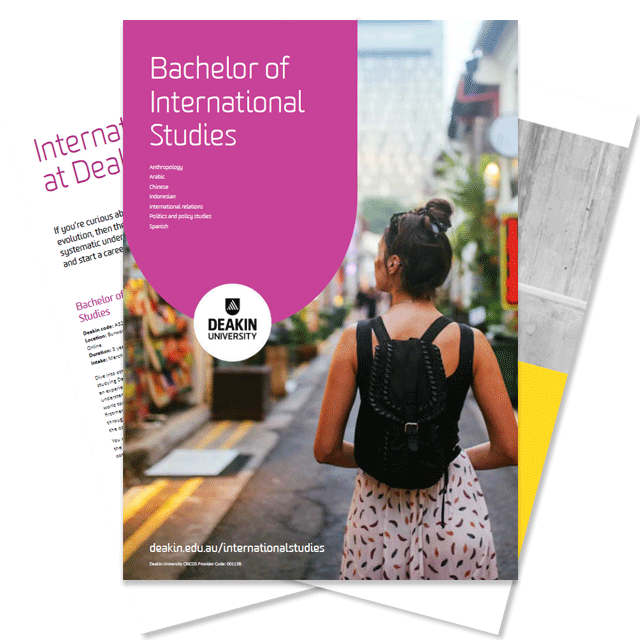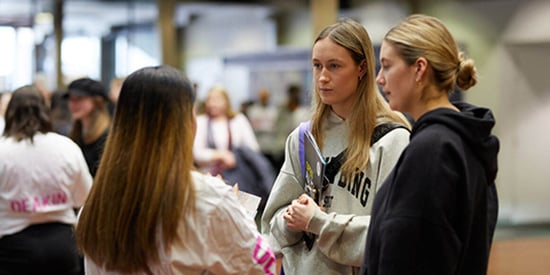Key facts
Key dates
Direct applications to Deakin for Trimester 2 2024 close 23 June 2024
Current Deakin Students
To access your official course details for the year you started your degree, please visit the handbook
Course overview
The Bachelor of International Studies is a course for students seeking an international orientation, with a commitment to a period of study at an overseas university, internship at an international organisation or participation in an in-country language program.
You will learn a range of skills in analysis and interpretation of the international forces shaping government, business and community life in contemporary Australia. You will also develop a systematic understanding of other countries and societies, as well as cross-cultural competencies, through an internationally oriented curriculum.
You can study major sequences in Anthropology, Arabic, Chinese, Indonesian, International Relations, Language and Culture Studies, Middle East Studies, Politics and Policy Studies or Spanish.
Read MoreCourse information
- Award granted
- Bachelor of International Studies
- Year
- 2018 course information
- VTAC code
- 1400314031 - Waurn Ponds (Geelong), Commonwealth Supported Place (HECS)
1400411201 - Waterfront (Geelong), Commonwealth Supported Place (HECS)
1400414031 - Waterfront (Geelong), Commonwealth Supported Place (HECS)
1400514031 - Burwood (Melbourne), Commonwealth Supported Place (HECS)
1400614031 - Online, Commonwealth Supported Place (HECS) - Deakin code
- A326
- CRICOS code?
- 075375D Burwood (Melbourne), Waterfront (Geelong)
- Level
- Undergraduate
- Approval status
- This course is approved by the University under the Higher Education Standards Framework.
- Australian Qualifications Framework (AQF) recognition
The award conferred upon completion is recognised in the Australian Qualifications Framework at Level 7.
Course structure
Student must successfully complete 24 credit points of study including:
- 6 core units
- a major selected from the major sequences listed below
- no more than 8 credit points taken outside the Faculty of Arts and Education
- at least 2 credit points of approved international experience such as:
- trimester of study at an overseas university exchange partner
- international internship (AIS330) or (AIS331)
- in-country language program (in Chinese, Indonesian or Arabic)
- approved study abroad program or approved study tour (AIS203), (AIR292) or other
- approved onshore internship with an international organisation (available for (AIS330) only)
- 2 credit points of consecutive language units other than an in-country language program (AIB151 & AIB152; AIB251 & AIB252; AIC181 & AIC182; AIC281 & AIC282; AIC283 & AIC284; AIF146 & AIF142; AIF241 & AIF242; AIF341 & AIF342; AIF145; ALS100 & ALS150; ALS200 & ALS250) can be taken to achieve one credit point of the international experience requirement
Notes:
(i) Students enrolled in D338 or D323 are not able to accommodate AIS331 International Internship B (4 credit points) within the 16 credit points allocated to the Bachelor of International Studies. However, AIS330 International Internship A (2 credit point) placements can be for up to 12 weeks if desired. Please contact the Unit Chair for further information.
(ii) It is envisaged that students would complete the international experience in the third or fourth year of their course.
Students are required to meet the University's academic progress and conduct requirements. Click here for more information.Core units
International Experience
All students must complete at least 2 credit points of international experience, selected from one or more of the following:
- trimester of study at an overseas university exchange partner
- international internship (AIS330 or AIS331)
- in-country language program (in Chinese, Indonesian or Arabic)
- approved study abroad program or approved study tour (AIS203 or other)
- approved onshore internship with an international organisation (available for AIS330 only).
- 2 credit points of consecutive language units other than an in-country language program can be taken to achieve one credit point of the international experience requirement
Further information on the international student experience and on previous students' overseas internships is available at: www.deakin.edu.au/arts-ed/internships/bis/map
Students seeking to undertake an internship will enrol in the appropriate unit (either AIS330 or AIS331) once the Unit Chair has approved their planned placement.
or
AIS330, AIS331 - Internship units are normally undertaken in third level (or equivalent) and are subject to completion of specified prerequisite units and special application requirements. Interested students should contact Arts and Education Student Services and Enrolment Enquiries on their campus for further information.
For further information regarding the in-country language programs, refer to the major sequences in Indonesian, Chinese and Arabic.
Major sequences
Refer to the details of each major sequence for availability.
Intakes by location
The availability of a course varies across locations and intakes. This means that a course offered in Trimester 1 may not be offered in the same location for Trimester 2 or 3. Check each intake for up-to-date information on when and where you can commence your studies.
Trimester 1 - March
- Start date: March
- Available at:
- Burwood (Melbourne)
- Waurn Ponds (Geelong)
- Cloud Campus
Trimester 2 - July
- Start date: July
- Available at:
- Burwood (Melbourne)
- Waurn Ponds (Geelong)
- Cloud Campus
Trimester 3 - November
- Start date: November
- Available at:
- Burwood (Melbourne)
- Waurn Ponds (Geelong)
- Cloud Campus
Deakin splits the academic year into three terms, known as trimesters. Most students usually undertake two trimesters each year (March-June, July-November).
Additional course information
Course duration - additional information
Course duration may be affected by delays in completing course requirements, such as accessing or completing work placements.
Mandatory student checks
Any unit which contains work integrated learning, a community placement or interaction with the community may require a police check, Working with Children Check or other check.
Participation requirements
Elective units may be selected that include work-based training or community-based learning. Placement can occur at any time, including during the standard holiday breaks listed here: https://www.deakin.edu.au/courses/key-dates.
Reasonable adjustments to participation and other course requirements will be made for students with a disability. Click here for more information.
Work experience
- Trimester of study at an overseas university exchange partner
- International internship (AIS330 or AIS331) *in-country language program (in Chinese, Indonesian or Arabic)
- Approved study abroad program or approved study tour (AIS203 or other)
- Approved onshore internship with an international organisation (available for AIS330 only).
- 2 credit points of consecutive language units other than an in-country language program can be taken to achieve one credit point of the international experience requirement
Need help?
Ask a question about studying at Deakin
Entry requirements
Recognition of prior learning
The University aims to provide students with as much credit as possible for approved prior study or informal learning which exceeds the normal entrance requirements for the course and is within the constraints of the course regulations. Students are required to complete a minimum of one-third of the course at Deakin University, or four credit points, whichever is the greater. In the case of certificates, including graduate certificates, a minimum of two credit points within the course must be completed at Deakin.
You can also refer to the Credit for Prior Learning System which outlines the credit that may be granted towards a Deakin University degree and how to apply for credit.
Fees and scholarships
Fee information
Learn more about fees.
The tuition fees you pay will depend on the units you choose to study as each unit has its own costs. The 'Estimated tuition fee' is provided as a guide only based on a typical enrolment of students undertaking the first year of this course. The cost will vary depending on the units you choose, your study load, the time it takes to complete your course and any approved Credit for Prior Learning you have.
Each unit you enrol in has a credit point value. The 'Estimated tuition fee' is calculated by adding together 8 credit points of a typical combination of units for that course. Eight credit points is used as it represents a typical full-time enrolment load for a year.
You can find the credit point value of each unit under the Unit Description by searching for the unit in the Handbook.
Learn more about fees and available payment options.
Scholarship options
A Deakin scholarship could help you pay for your course fees, living costs and study materials. If you've got something special to offer Deakin - or maybe you just need a bit of extra support - we've got a scholarship opportunity for you. Search or browse through our scholarships
Apply now
Applications for Trimester 1, 2025 open in August. Each year, thousands of students prepare for uni with the help of Deakin support services. We offer a huge range of support, including one-on-one consultations, webinars, online resources and events throughout the year.
Some of our courses have limited places available - for the latest on courses still open for application, visit Courses by trimester.
Create an account in the Deakin Application Portal, start your application, enter personal details, education experience, upload supporting documents and submit. Need help? Play this video, or contact one of our friendly future student advisers on 1800 693 888 or submit an online enquiry.
You can apply for this course through the Indigenous Access Scheme, which recognises the achievements of Aboriginal and Torres Strait Islander students and considers the skills, experience and community work that prepares you for study. We look beyond your ATAR and academic results so we can reward your hard work with a place at university.
Entry pathways
View pathways into the Bachelor of International Studies with our pathways finder.
Contact information
Arts and Education Student Services and Enrolment Enquiries
Waurn Ponds (Geelong)
Tel 03 5227 1359
Burwood (Melbourne)
Tel 03 9246 8100
Cloud (online)
Tel 03 5227 1359
Email: artsed@deakin.edu.au
Careers
Want a degree that’s more than just a qualification? Our industry connections, world-class facilities and practical approach to learning are just some of the reasons why Deakin students graduate confident and ready to thrive in the jobs of tomorrow.
Career outcomes
As a graduate of this course you will have the skills and experience necessary for a range of positions in the public sector including areas of diplomacy, defence, immigration, education, finance, communications, trade and aid; large corporations and small or medium sized businesses with an international orientation; and non-government organisations with regional and global links.
For more information go to DeakinTALENT
Course learning outcomes
Deakin's graduate learning outcomes describe the knowledge and capabilities graduates can demonstrate at the completion of their course. These outcomes mean that regardless of the Deakin course you undertake, you can rest assured your degree will teach you the skills and professional attributes that employers value. They'll set you up to learn and work effectively in the future.
| Deakin Graduate Learning Outcomes | Course Learning Outcomes |
| Discipline specific knowledge and capabilities | Review, analyse and interpret international forces shaping government, business and community life in Australia and in other countries pertaining to cross-cultural communication and interactions; knowledge and skills transferability; the principles of personal and professional development and their application; and working in diverse organisational contexts, and respond to these issues in a theoretically-informed and contextually-appropriate manner drawing upon both scholarship and practice. |
| Communication | Effectively communicate ideas, arguments and analyses of cross-cultural communication, knowledge and skill transferability, personal and professional development and diverse organisational contexts in a selection of written, digital and oral formats to a range of audiences including practitioners working in the area of International Studies. |
| Digital literacy | Employ a range of digital technologies and platforms appropriately to conduct research, engage in discussion and debate, document personal and professional skills and attributes, communicate effectively with and deliver reports and presentations to a diverse range of audiences within and outside the field of International Studies. |
| Critical thinking | Analyse and critically evaluate theoretical approaches to issues in International Studies pertaining to cross-cultural communication, knowledge transferability, personal and professional development and working in diverse organisational contexts and demonstrate the appropriate application of theoretical knowledge in different cultural and organisational settings. |
| Problem solving | Employ initiative and creativity in conjunction with appropriate Social Science methods of research and analysis including self-reflection to systematically investigate and generate context-sensitive and pragmatic solutions to complex real-world problems pertaining to cross-cultural communication, knowledge transferability, personal and professional development and diverse organisational contexts. |
| Self-management | Demonstrate autonomy, responsibility, accountability and a sustained and ongoing commitment to learning and skill development as a reflective practitioner in the area of International Studies and its communities of practice and scholarship. |
| Teamwork | Work and learn collaboratively with others in the field of International Studies and from other disciplines and backgrounds while still maintaining responsibility for their own learning. |
| Global citizenship | Analyse and respond appropriately to issues of cross-cultural communication and the transferability of knowledge and skills in different geographic, knowledge and organisational contexts as a reflective scholar and practitioner, taking into consideration cultural and socio-economic diversity, social and environmental responsibility and adherence to professional and academic ethical standards. |
| Approved by Faculty Board May 2014 | |





